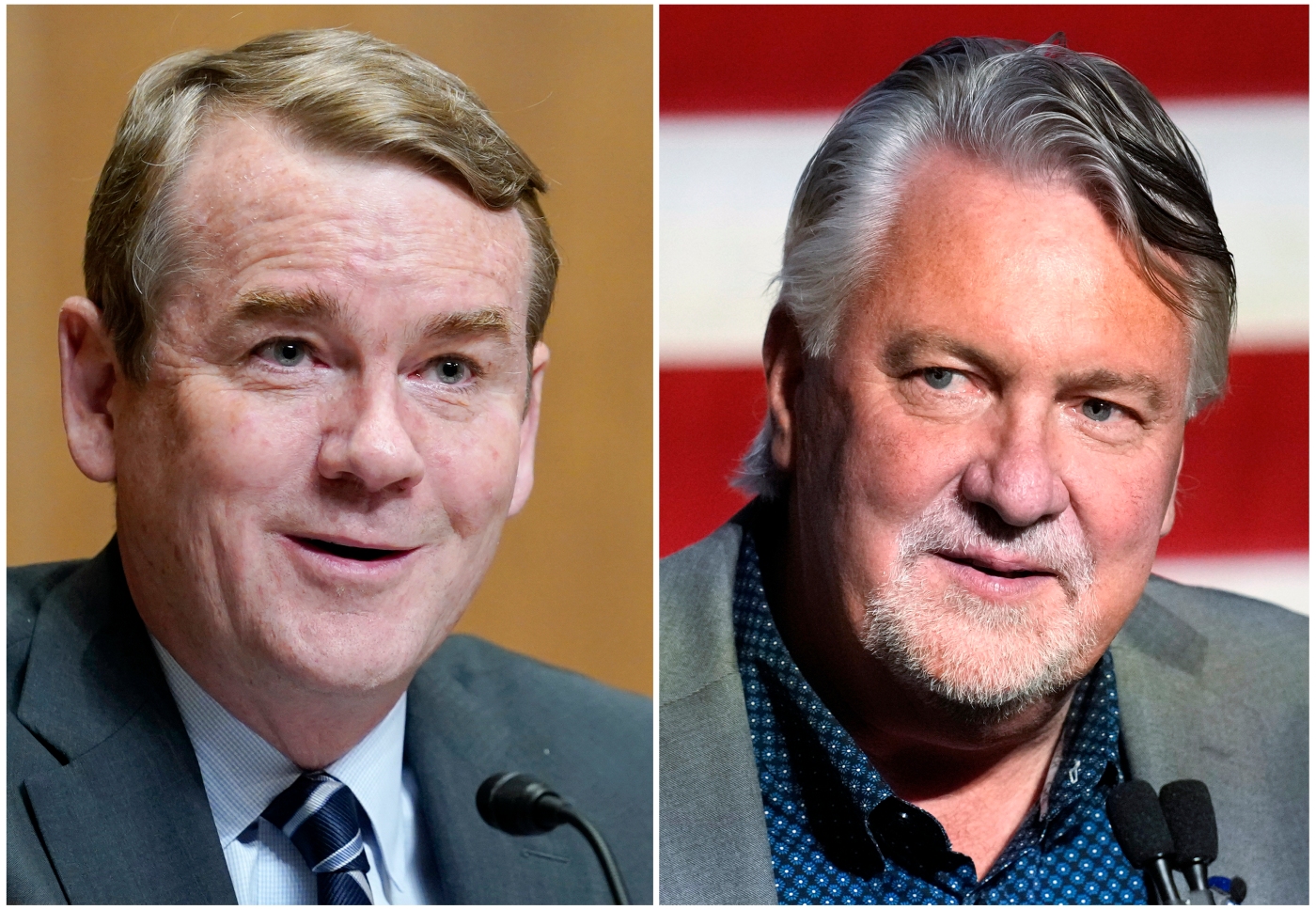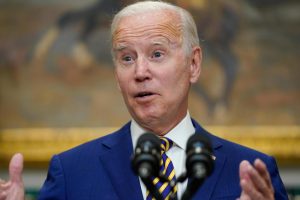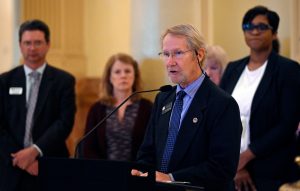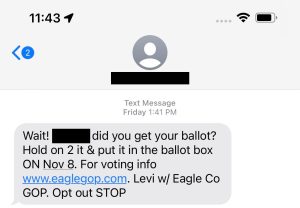Kari Lake, the Republican candidate for governor of Arizona, refused Sunday to commit to accepting the results of her election, using much of the same language that former President Donald Trump did when he was a candidate.
“I’m going to win the election, and I will accept that result,” Lake said in an interview on CNN’s “State of the Union.”
The host, Dana Bash, then asked, “If you lose, will you accept that?” Lake, who is running against Arizona’s Democratic secretary of state, Katie Hobbs, responded by repeating, “I’m going to win the election, and I will accept that result.”
“The people of Arizona will never support and vote for a coward like Katie Hobbs,” she added, setting up a framework in which, if Hobbs were to win, Lake could present the result as evidence of election fraud. That is one of the arguments Trump made, suggesting that the 2020 election must have been fraudulent because the idea of President Joe Biden receiving majority support was unbelievable.
Four years earlier, in 2016, Trump told supporters, “I will totally accept the results of this great and historic presidential election if I win.”
In Sunday’s interview, Lake, a former television news anchor, continued to embrace Trump’s lie that the 2020 election was stolen and said, “The real issue, Dana, is that the people don’t trust our elections.”
This is a common argument among Republicans, many of whom have stoked public distrust in elections and then used that distrust to justify restrictions on voting. Lake said the distrust dated back more than two decades, citing the 2000 presidential election dispute and Democrats’ claims of irregularities in 2004 and 2016, even though the Democratic candidates conceded and there were no extrajudicial efforts to overturn the results.
Here is what else happened on the Sunday morning talk shows.
Lake and Hobbs discussed inflation
Before the exchange about elections, Lake talked about the topics that dominate campaigns when democracy is not at issue — as did Hobbs in a separate interview on CNN.
Lake said she would address the impacts of inflation by eliminating Arizona’s taxes on rent and groceries and using the state’s general fund to replace lost revenue for local governments. Hobbs said she would provide child care assistance and a tax credit for career and technical education and try to increase housing construction to lower home prices.
Hobbs also reiterated her support for abortion rights. Asked if she supported “any legal limits” on abortion, she did not endorse any, noting that abortions late in pregnancy were very rare and saying, “Politicians don’t belong in those decisions.”
Lake, who has campaigned on promises of an immigration crackdown, was asked whether she believed the United States had a responsibility to accept asylum-seekers fleeing political violence.
“We have a great legal immigration system, a very generous legal immigration system. But we can’t afford to take on the world’s problems right now when so many Americans are struggling, so many Arizonans are struggling,” Lake said. She also said that many asylum applications were fraudulent.
Evan McMullin said he wouldn’t join either party
Evan McMullin, an independent candidate, is posing an unexpectedly strong challenge to Sen. Mike Lee, R-Utah, although Lee is still favored. In an interview on NBC’s “Meet the Press,” McMullin said unequivocally that he would not caucus with either party, even if his affiliation made the difference between a Democratic or Republican majority.
McMullin, who also ran for president as an independent in 2016, said that his campaign was building a “coalition” of support across party lines and that he had made a commitment to that coalition to “maintain my independence.”
The host, Chuck Todd, pressed him multiple times, first asking whether that commitment would extend through all six years of a Senate term and then asking twice whether his thinking would change if party control were on the line. His responses were consistent.
“I will not caucus with Democrats or Republicans,” he said. “I’m going to maintain my independence because I think our country needs that, and certainly our state needs that. I’ve made that commitment, and for party bosses and others in Washington, they’re going to have to figure out what this means for them.”
He argued that having an independent senator would give Utah more influence.
“With Sen. Lee, we get none of that,” he said. “He sits on his hands until it’s time to vote no, and then he goes and complains about our country on cable news, and I’m just not going to do that.”
McMullin said that he would not have voted for the Democrats’ Inflation Reduction Act “as written” but that he supported parts of it, including allowing Medicare to negotiate prescription drug prices. He would not say whether he would support federal legislation on abortion, saying only that he opposed bans without exceptions for rape and incest and supported increasing access to contraception.
The Colorado Senate candidates made their cases
Sen. Michael Bennet, D-Colo., and his Republican opponent, Joe O’Dea, were interviewed back-to-back on CNN.
The main topic was inflation, for which O’Dea blamed the $1.9 trillion pandemic stimulus package, passed in March 2021, and the Biden administration’s energy policies. Bennet blamed “broken global supply chains” and Russia’s invasion of Ukraine. (The causes of inflation — which is happening all over the world — are complex, and multiple factors are driving it.)
Bennet said he believed the Inflation Reduction Act would live up to its name once its provisions kick in fully next year. He emphasized the billions of dollars it includes for clean energy development, arguing that the funding would allow the country to “increase our energy independence and our economic strength and reduce emissions” at the same time.
O’Dea called for loosening the permitting process for new energy projects, naming natural gas alongside renewable energy but, notably, not mentioning oil or coal. “It’ll cause the price to come down, inflation will go away — that’s how you do it,” he said.
O’Dea also said, as he has before, that he did not want Trump to run for president again and would “actively campaign against” him in a Republican primary; he named Ron DeSantis, Nikki Haley and Tim Scott as candidates he could support instead. He did not say what he would do in the general election if Trump won the primary.
This article originally appeared in The New York Times.
Join the Conversation
We invite you to use our commenting platform to engage in insightful conversations about issues in our community. We reserve the right at all times to remove any information or materials that are unlawful, threatening, abusive, libelous, defamatory, obscene, vulgar, pornographic, profane, indecent or otherwise objectionable to us, and to disclose any information necessary to satisfy the law, regulation, or government request. We might permanently block any user who abuses these conditions. As of June 15, 2022, comments on DenverPost.com are powered by Viafoura, and you may need to log in again to begin commenting. Read more about our new commenting system here. If you need help or are having issues with your commenting account, please email us at memberservices@denverpost.com.






